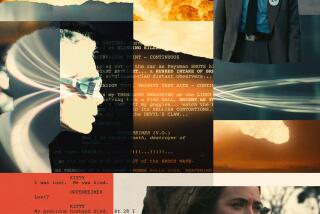Stallion Gate by Martin Cruz Smith (Random House: $17.95; 321 pp.)
- Share via
The background of Martin Cruz Smith’s new novel is the birth of the Atomic Age--dramatic material, but with a problem. The tale is as familiar as Cinderella. We know who the glass slipper fits, that the bomb will work and that Klaus Fuch will betray us. But we don’t know how Sgt. Joe Pena will extricate himself from the troubles with which life and an Army Intelligence Officer named Augustino have beset him. That’s Smith’s secret. And since he’s one of fiction’s master craftsmen, he quickly makes us care about it. We focus on Pena, while J. Robert Oppenheimer, Edward Teller and their henchmen are changing our future in the background.
Pena is as memorable as Arkady Renko, the Moscow policeman of “Gorky Park.” He is a pueblo Indian, a sometime prize fighter, a jazz pianist and an Army misfit who appeals to the wrong women. He looks upon his pueblo culture with fond, but impatient, amusement and upon white science with respectful distaste. When Oppenheimer was a student at Los Alamos Ranch school, Pena had taught him to ride. Now Oppy has returned to Los Alamos to build the bomb. Capt. Augustino, scenting treason, springs Pena from prison to serve Oppy as driver/handyman while he serves the Army as inside snitch.
Smith uses history to make the heavy background music while Pena’s story provides the melody. We see the founding giants of the atomic age only as their paths cross Pena’s, and we see the Manhattan Project bearing its fruit only as it would have been seen by the director’s handyman. The Bomb provides the tension, but Pena tells the tale.
While preparing the book, Smith lived in Santa Fe, picking up a feeling for the Rio Grande pueblo culture and interviewing old-timers from the project. He absorbed oddity, anecdotes and personal quirks--stuff that makes historic personages come alive. Thus, we see the nervous instability of Oppenheimer, the humorless arrogance of Fuch, and the fustiness of Gen. Groves. And while we see what went on at Los Alamos no better than Oppenheimer’s driver might have, what we do see adds up in an odd way to a makeshift reality of a makeshift project.
Smith’s skill at showing us just a little and letting our imagination work often moves us past craftsmanship into poetry. For example, Oppy’s party, on its way to the Trinity Site, becomes lost in the empty darkness of the Tularosa Basin--a bombing range. As the scientists wait for a guide, bombers appear. Flares drop. Then Pena sees this:
“a . . . phosphorus bomb as bright as snow crystals lit the valley floor. From the bomb came running shapes: horses, brilliant with lather and the glare of the bomb, racing under the wing. Mustangs out of the mountains for the night grazing and the mares the ranchers had left behind. Joe couldn’t make out the individual horses, only the motion of their rocking and straining, urged by the dazzle of tracers, and the way they wheeled from rays of burning phosphorus. At a distance of a mile, he thought he could hear not only their hooves but their breath, although he knew they were drowned out by the sound of pistons and hydraulics and .50 caliber rounds. Then the mustangs and the bombers moved on together like a single storm . . . “
Other scenes are as rich in understated meaning. We see the clown fraternity of Santiago Pueblo mocking Manhattan Project, begging Oppenheimer to light their firecracker. We see Fuch telling a pueblo jewelry peddler that turquoise is “only a phosphate of copper and aluminum.” We see The Bomb dangling precariously under a jammed pulley. A private named Eberly, high in the test tower, can unjam it by a death-defying walk across a four-inch girder. Eberly wavers.
“Jaworski ran from the Keep. ‘Don’t try it.’
‘Try it,’ Oppy whispered.”
Exactly what we expect. After watching the bombers machine gunning horses, we’d heard Oppy say: “It was awful, but it was still beautiful.”
Martin Cruz Smith, master-craftsman of the good read, has given us another dandy.
More to Read
Sign up for our Book Club newsletter
Get the latest news, events and more from the Los Angeles Times Book Club, and help us get L.A. reading and talking.
You may occasionally receive promotional content from the Los Angeles Times.







